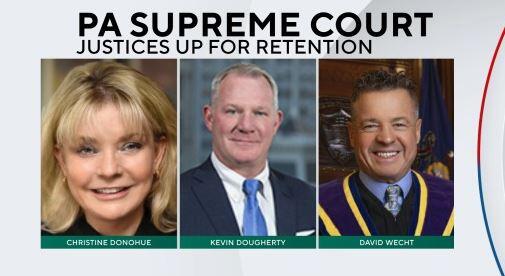Money, attention pour into normally under-the-radar Pennsylvania Supreme Court retention vote
It's generally not the headline on most voters' ballots, but in Pennsylvania in 2025, the retention of three state Supreme Court justices is drawing an unusual amount of attention — and cash.
According to the Brennan Center for Justice at New York University, an estimated $9.1 million has poured into the race as of Oct. 30, most of it from outside groups.
But why is all that cash pouring into an election that may draw around 20% turnout? Much of it has to do with the ideological balance of the court.
"We're seeing a lot of the partisanship that you see at the national level has hit home here in Pennsylvania," said Lauren Cristella, president and CEO of the Committee of Seventy, a nonprofit civic group based in Philadelphia. "And races that were typically not supposed to be partisan, the races don't even have Rs or Ds on the ballot, you'll not see that when you go to the polls on election day. But the partisanship at the national level has certainly affected this race and the spending you're seeing."
This year's ballot will feature three justices up for retention: Christine Donohue, Kevin Dougherty and David Wecht. All three won election in 2015 running as Democrats, and now the court has a 5-2 leftward lean. And with three justices on the ballot at once, Republicans see an opportunity to be able to flip the court's makeup. But that would also take time.
Pennsylvania's system for electing and retaining Supreme Court justices is unusual. It was put into place in 1968, Cristella said, to help take some partisanship out of judicial races.
It begins with a partisan race, Republicans vs. Democrats. The winner is elected to a 10-year term. After that term ends, justices would go through non-partisan retention elections. They're not facing any opponent on a ballot, just a simple "yes" or "no" vote on whether to keep them on the court.
"They typically aren't contentious races," Cristella said. "In fact, only one person has not been retained since that change in 1968. That was in 2005."
However, if justices are not retained, that would trigger an election. But that wouldn't happen until 2027, and Cristella said there's no mechanism in state law for a special election.
The governor could appoint interim justices to fill seats until that election, however they would also need approval from two-thirds of the state Senate, currently held by Republicans.
"With the way we're seeing, like, even the state budget go right now, I don't see anyone getting confirmed if that scenario were to happen," Cristella said.
That could leave the court at a 2-2 split. Cristella said it would likely lead to "random assignments" of judges from the Court of Common Pleas or State Superior Court to fill in. But whether that's on a case-by-case basis or for a period of time is something the Committee of Seventy is still looking into.
But all the attention and money spent could help drive turnout in a cycle Cristella described as typically having "the least amount of participation." She noted primary election turnout was around 16%, and expects the retention election could drive numbers up.
"This is getting a lot of attention, and we're so glad that people are starting to pay attention and talk about it. And we do expect it to be higher than what it has been," Cristella said. "But certainly not expecting presidential turnout levels."
Donohue, one of the justices running to remain on the bench, said she's "shocked at the partisan nature" of the election.
"This is extraordinarily unusual," Donohue told The Associated Press in an interview on Wednesday. "I suppose that's a sign of the times, though."
Spending soars
Democrats and their allies were on course to outspend Republicans by a ratio of as much as 4-to-1 after a blitz of TV ads in the final weeks to counter a wave of Republican flyers and commercials.
The TV ads supporting the justices portray them as defenders of abortion rights, union rights and voting rights. Backing them are labor unions, trial lawyers and Planned Parenthood's political arm.
While not all spending or financial sources have been disclosed publicly, groups linked to a network that typically spends campaign contributions from Pennsylvania's richest man, securities billionaire Jeffrey Yass, so far has spent about $2 million, according to figures from AdImpact, which tracks advertising.
Election Day is Nov. 4.
